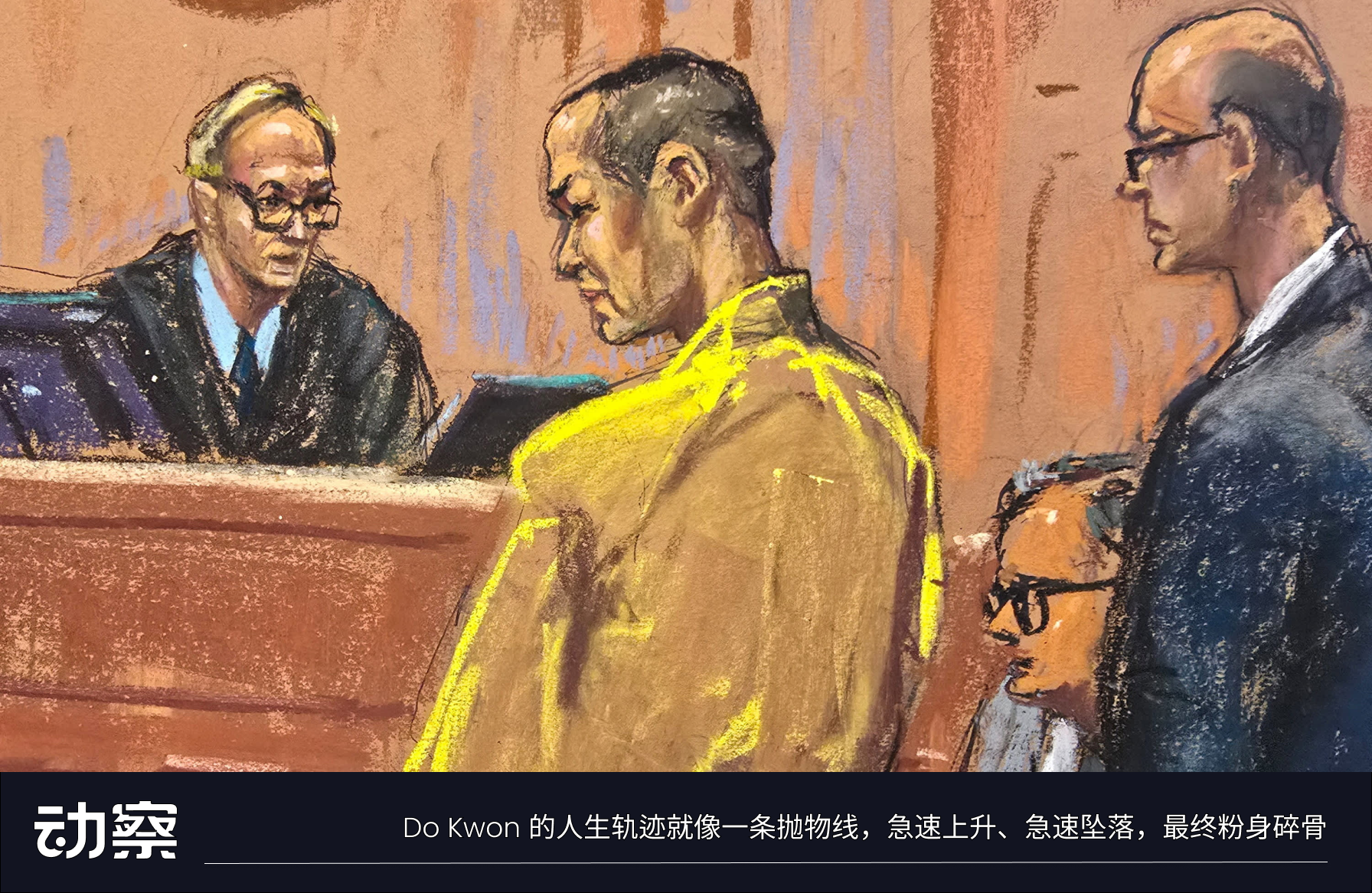
On August 12, 2025, Do Kwon, wearing a yellow prison uniform, slowly stood up in the federal court in Manhattan, New York.
Years of escape and imprisonment had left his once chubby cheeks thinner, and his hair styled like the inmates' buzz cut. The eyes that once sparkled before the camera now revealed only fatigue.
This 33-year-old South Korean man, once the darling of the crypto world, is now the protagonist of the largest financial fraud case in history.
In a court sketch, Do Kwon, with his head bowed and his hands clasped, pleaded guilty: “In 2021, I made false and misleading statements regarding the reasons for the TerraUSD repeg. What I did was wrong, and I want to apologize for my actions.”
Now, he faces years in prison and a hefty fine, but that won't be enough for the hundreds of thousands of investors who lost $40 billion to him.
Time is the cruelest judge. It not only changed Do Kwon's appearance, but also completely destroyed everything he once had.
Prosecutor Damian Williams said outside the court that the guilty plea was a "significant milestone in the enforcement of cryptocurrency fraud cases." But the word "milestone" sounds too cold. It can't reconcile those broken families, can't comfort the elderly who have lost everything, and can't save the young people who have chosen to end their lives.
From elite schools in Seoul to Stanford, from skyscrapers in Singapore to a dilapidated prison in Montenegro, Do Kwon's life trajectory is like a parabola, rising rapidly, falling rapidly, and finally shattered.
The birth of a genius
From Seoul to Silicon Valley
When Do Hyeong Kwon cried for the first time in a Seoul hospital on September 6, 1991, no one could have predicted that the baby would 30 years later become one of the most controversial figures in global financial history.
He was born into a typical middle-class Korean family. His father was an engineer, his mother a teacher. This combination embodies the worship of knowledge and the desire for success in Korean society. South Korea is a country deeply plagued by educational anxiety, where children are thrust into competition from kindergarten onwards. From a young age, Do Kwon displayed intelligence beyond his years, especially his mathematical talent. It seemed as if numbers automatically arranged themselves into the most elegant solutions before him.
He attended Daewon Foreign Language High School in Seoul, one of South Korea's most elite schools. Here, the nation's brightest students gathered, spending the three most crucial years of their lives in this ivory tower. His classmates remembered Do Kwon as the first to finish their homework, the one most eager to challenge the teacher's opinions. His intelligence was obvious, but even more evident was his self-confidence. While this confidence might have been endearing during adolescence, it also sowed the seeds of tragedy later in life.
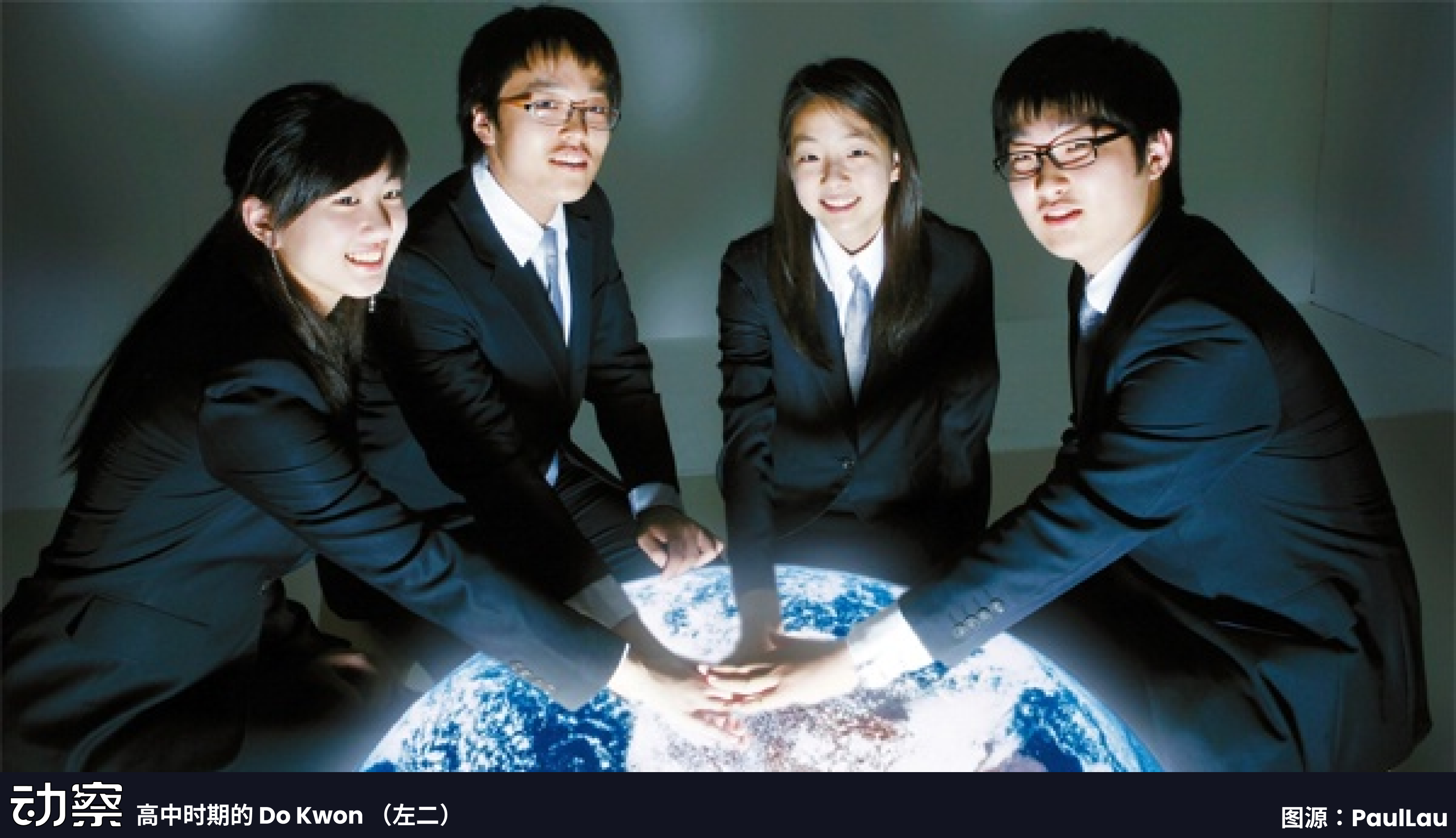
Even at that age, he already believed he was special, destined for great things. In high school, Do Kwon was like a star gathering energy, waiting to burst forth with dazzling brilliance on a larger stage. And that stage was across the ocean at Stanford.
In 2010, 19-year-old Do Kwon boarded a flight to the United States. For a young Korean, attending Stanford University meant a life-changing experience. Located in the heart of Silicon Valley, Stanford University is the birthplace of countless tech legends.
Computer science courses weren't difficult for Do Kwon; what truly captivated him was the entrepreneurial atmosphere. Here, every student dreamed of becoming the next Steve Jobs or Mark Zuckerberg, and every idea had the potential to become the next world-changing product. Silicon Valley possessed a unique magic that instilled in people the belief that technology could solve every problem and instilled in young people the belief that they could revolutionize the world. Do Kwon was deeply captivated by this culture.
Bitcoin had just been launched, and Do Kwon, with his keen eye, began delving into blockchain technology, reading Satoshi Nakamoto's white paper and participating in related project development. While his classmates were still anxious about finding jobs, Do Kwon was already thinking about how technology could redefine money itself. He believed that the traditional financial system was outdated and inefficient, while blockchain technology represented the future.
Do Kwon's time at Stanford shaped his worldview. It taught him to think in technical terms and see the world through the eyes of an entrepreneur. Most importantly, it solidified his conviction that he was destined to change the world.
Do Kwon graduated from Stanford University in 2015. He was no longer the young, immature teenager from Seoul. He had become a confident young man, a visionary who believed he could achieve something great. His resume boasted a bachelor's degree in computer science from Stanford, and his heart burned with the ambition to change the world.
The road to entrepreneurship
Back in South Korea, Do Kwon faced a choice: to join a large company like Samsung and live a stable and respectable life like most of his classmates, or to embark on the risky path of entrepreneurship. For a young man who had been nurtured by the entrepreneurial culture at Stanford, the answer was obvious.
In 2016, 25-year-old Do Kwon founded Anyfi, his first entrepreneurial venture. He envisioned leveraging blockchain technology to allow users to share their Wi-Fi networks and earn token rewards. He believed that traditional telecom operators were monopolies, and Anyfi could disrupt this through technological means, allowing ordinary people to benefit from network infrastructure.

The project garnered some early attention and investment. Do Kwon began appearing frequently at tech events in South Korea, presenting his project and concept. His presentations were passionate, and his vision sounded exciting. Amidst the spotlight, Do Kwon reveled in the aura of entrepreneurial stardom. But reality soon struck him hard. The Anyfi project faced numerous challenges, and the infrastructure at the time was far from mature enough to support such a complex application. The gap between technological ideals and business reality was far greater than Do Kwon had imagined.
At the end of 2017, Anyfi failed. For any entrepreneur, this is an incredibly painful experience; failure is bitter, forcing one to question their abilities and rethink their decisions. But Do Kwon saw it differently. He saw Anyfi's failure as the result of poor timing, a market unprepared for such a cutting-edge concept, and investors lacking the foresight to support such a project.
This thinking pattern is called "self-serving bias" in psychology. People tend to attribute success to internal factors (such as their own ability) and failure to external factors (such as bad luck).
For Do Kwon, this self-serving bias, far from helping him learn from his failure, actually bolstered his confidence. He began to turn his attention to the then-emerging field of decentralized finance, specifically stablecoins. He saw this as an opportunity to "redefine money itself" and a chance to leave his mark on history.
In January 2018, Singapore welcomed a new company - Terraform Labs.
The company's co-founders are Do Kwon and Daniel Shin, two young graduates from top universities who are both passionate about blockchain technology and believe they can change the world.
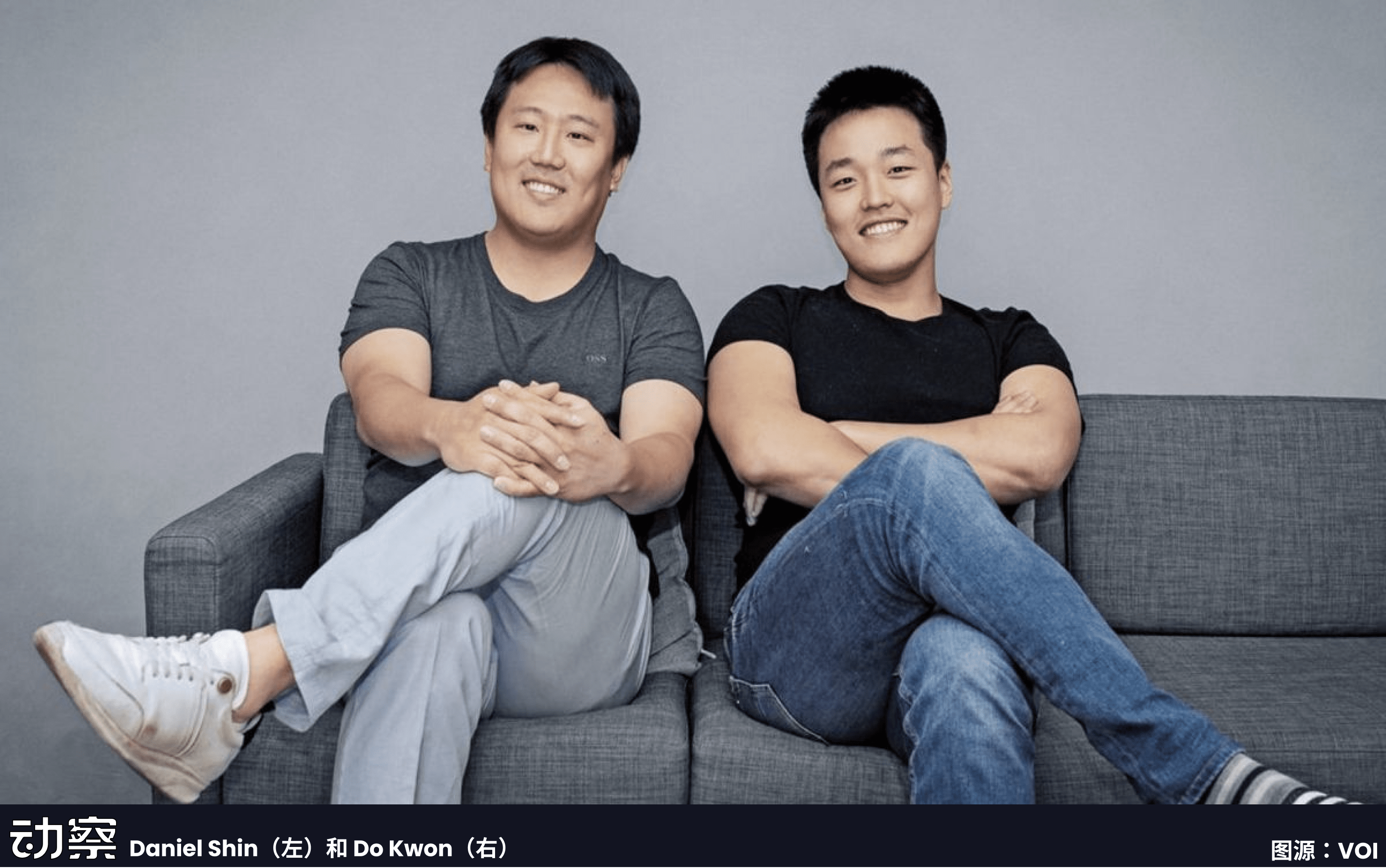
Choosing Singapore as our headquarters was a shrewd decision. This city-state is not only Asia's financial hub, boasting a robust financial infrastructure and a global talent pool, but more importantly, it has a relatively open regulatory stance toward blockchain technology. Singapore's commitment to innovation and streamlined regulations provide an ideal environment for startups like Terraform Labs to thrive.
Their core concept sounds simple: create an algorithmic stablecoin system that combines the decentralization of Bitcoin with the stability of the US dollar. This system consists of two tokens: TerraUSD (UST), a stablecoin whose goal is to maintain a 1:1 exchange rate with the US dollar; and Luna, a governance token used to maintain system stability.
The relationship between the two is like a seesaw: when the UST price is higher than $1, the system will mint more UST and destroy Luna, thereby increasing the supply of UST and depressing its price; when the UST price is lower than $1, the system will destroy UST and mint Luna, thereby reducing the supply of UST and pushing up its price.
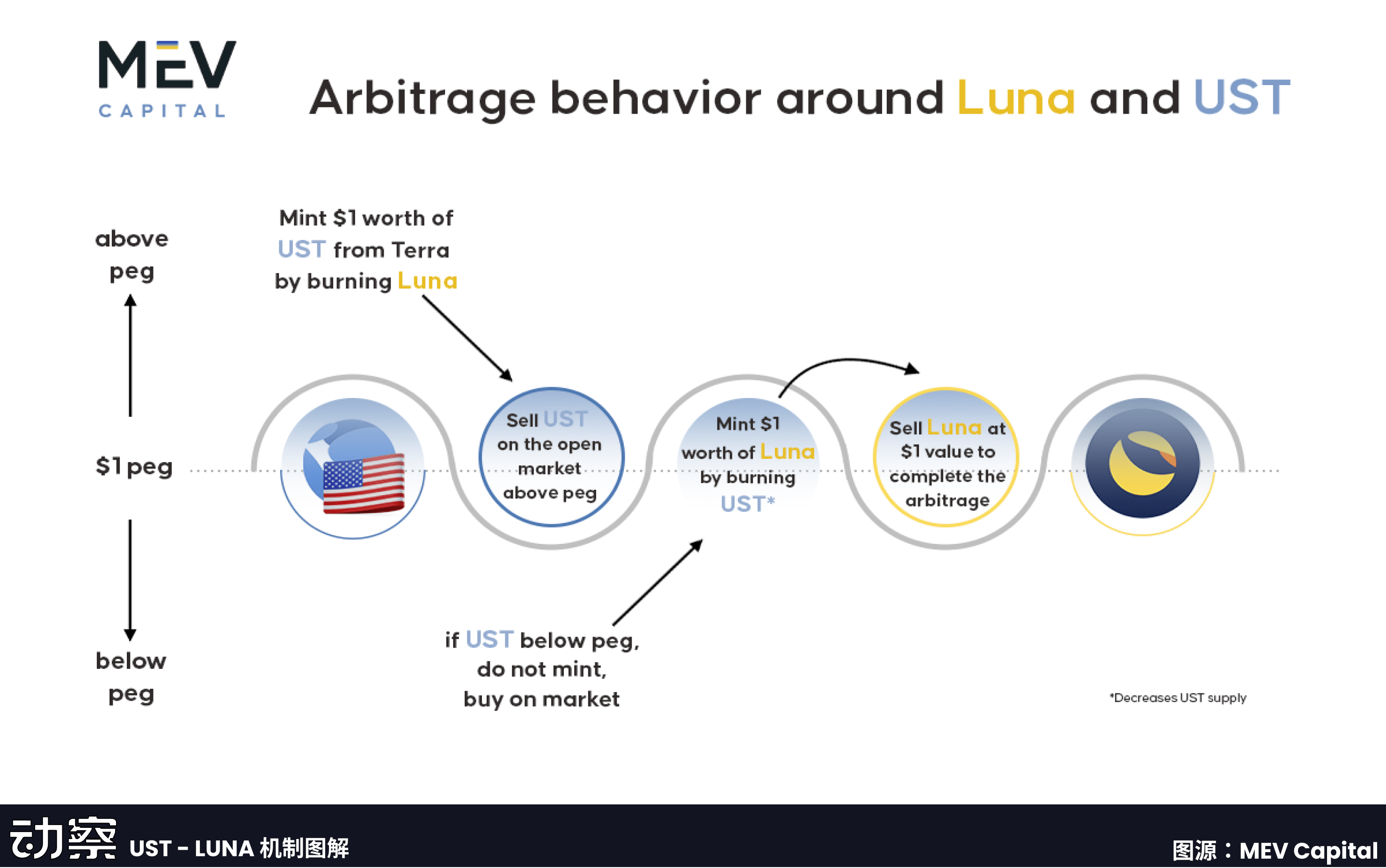
This mechanism does not require bank deposits or government bonds as reserves and relies entirely on the market and algorithms to maintain stability.
Do Kwon likened this system to the "gravitational system of the digital world," calling it a revolution in the history of currency. In his view, traditional stablecoins are like balloons tethered to a rope, while UST is like a planet with its own gravity, naturally maintaining a stable orbit.
Do Kwon demonstrated exceptional persuasive skills during the fundraising process. He was able to explain complex technical concepts in clear and concise language, and he could articulate a grand and compelling vision. More importantly, he convinced investors that he was the one who could realize that vision. In August 2018, Terraform Labs completed a $32 million seed round of funding from renowned investors such as Binance Labs, Polychain Capital, and Coinbase Ventures. These investments not only provided financial support but, more importantly, gave the project authoritative endorsement.
In April 2019, the Terra blockchain officially launched. This day held special significance for Do Kwon, marking his transformation from a failed entrepreneur to a leader poised to change the world.
Meanwhile, Terraform Labs began building the Terra ecosystem. They launched the Terra Station wallet, allowing users to easily store and transfer Terra tokens. They partnered with Korean e-commerce platforms to allow users to shop with Terra tokens. They also began developing various decentralized applications to increase demand for UST.
By the end of 2020, the Terra ecosystem had begun to take shape. UST's market capitalization reached hundreds of millions of dollars, and the price of Luna was steadily rising. More importantly, a growing number of users began using Terra's various services. In the cryptocurrency community, Do Kwon was hailed as a pioneer of algorithmic stablecoins, and the Terra project was considered one of the most promising in the DeFi space.
In this environment, Do Kwon and his Terra empire continued to expand rapidly, heading towards greater success and deeper abyss.
A towering building rises from the ground
Gold and Jade and Rotten Cotton
2021 is a watershed year in Do Kwon's destiny.
That year, he launched Anchor Protocol, a lending protocol that promises a 20% annual yield on UST deposits. In the traditional financial world, such a yield is unimaginable, and even the most aggressive hedge funds would find it difficult to consistently provide such high returns.

Do Kwon envisions Anchor Protocol as the core engine of the Terra ecosystem. High yields will attract large amounts of capital, increase demand for UST, and drive up the price of Luna, creating a positive flywheel.
But this logic has a fatal flaw.
To maintain this 20% yield, which requires real economic activity, Anchor Protocol needs approximately $6 million in daily subsidies. These subsidies primarily come from Luna Foundation Guard (LFG), a foundation controlled by Terraform Labs.
In other words, Anchor Protocol's high yields are essentially a Ponzi scheme, using new investors' money to pay old investors' returns. But Do Kwon never describes it that way. In his speech, Anchor Protocol is "the future of decentralized finance" and "the end of traditional banking."
By early 2022, Anchor Protocol's TVL exceeded $14 billion, making it one of the largest DeFi protocols at the time. Investors from around the world flocked to invest their capital. Do Kwon was intoxicated by their enthusiasm and trust. He began to believe he had truly created a miracle, truly found the Holy Grail of finance.
At the same time, Do Kwon launched Mirror Protocol, a synthetic asset platform. Publicly, the platform was described as "completely decentralized," with no single individual or entity unilaterally controlling the protocol. However, this was not the case. A subsequent SEC investigation revealed that Do Kwon secretly maintained control over Mirror Protocol. He could unilaterally modify protocol parameters, decide which synthetic assets were added or removed, and even halt the entire protocol.
An even more serious fraud is Chai. Beginning in 2019, Do Kwon repeatedly claimed that Chai used the Terra blockchain to process transactions and that its transaction volume reached "billions of dollars." This claim was incorporated into pitch decks and used in media interviews, serving as crucial evidence of Terra's practical use cases. Investors were genuinely persuaded by this data; after all, while most blockchain projects remain mere concepts, Terra appears to have real-world applications.
According to the SEC’s investigation, this was also false.
Transactions on the Chai platform are actually processed through traditional financial networks and have no connection to the Terra chain. Do Kwon and Terraform Labs executives were fully aware of this fact, yet they continued to make misleading statements to investors. This was deliberate fraud, but in Do Kwon's view, some "details" could be ignored as long as they could attract more investment and drive up token prices.
pride and Prejudice
Success has made Do Kwon extremely arrogant.
In July 2021, when British economist Frances Coppola criticized the design flaws of algorithmic stablecoins on Twitter, Do Kwon responded: "I don't debate with poor people. Sorry, I don't have any change to give her right now."
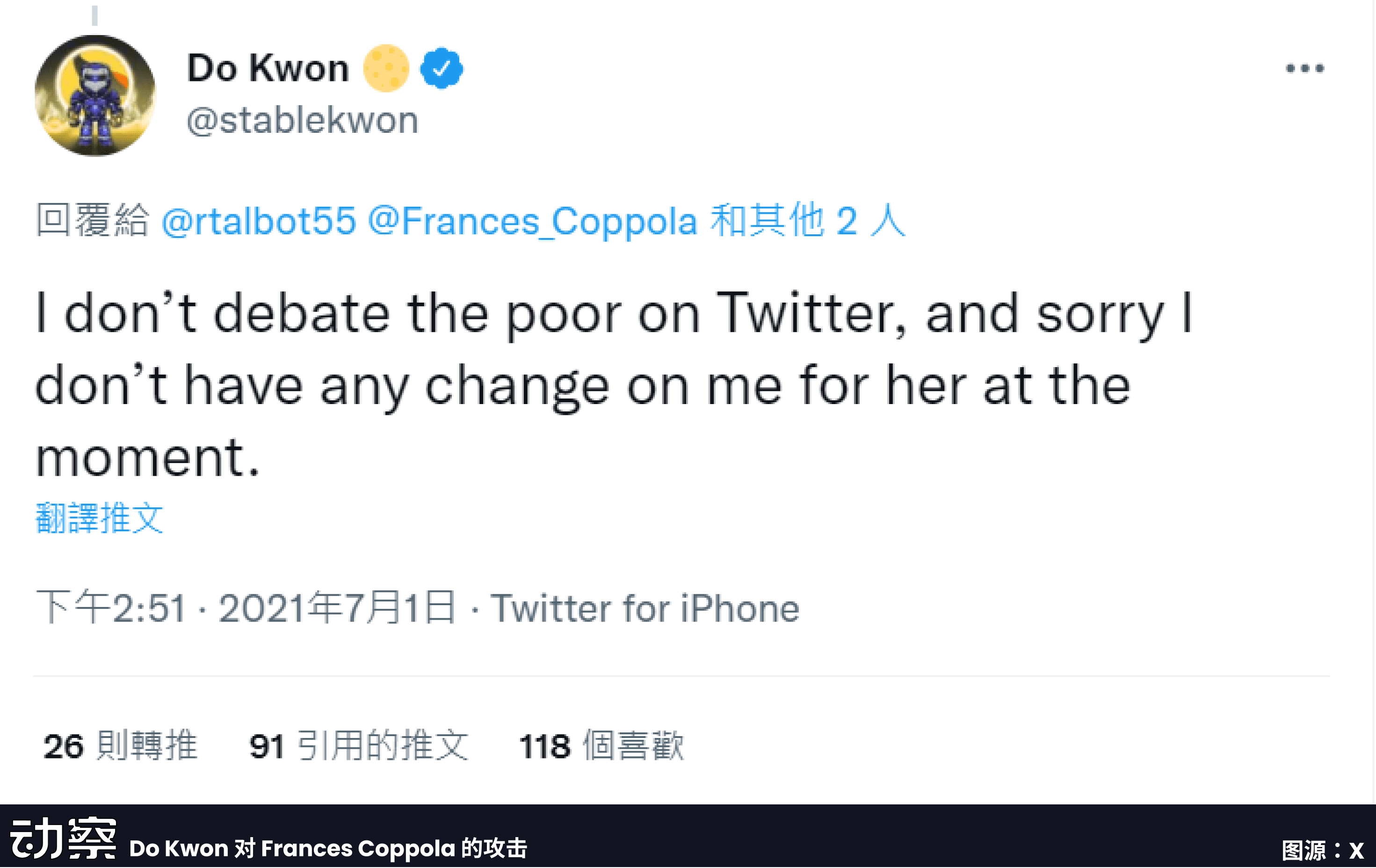
This statement was an insult to a scholar and a declaration of war against all skeptics. In his view, wealth equates to correctness, and those who criticize him are not justified, but simply "poor." This statement sparked an uproar on social media. Supporters hailed Do Kwon as a powerful rebuttal to traditional scholars. Critics, however, saw it as a revelation of his true nature: a nouveau riche whose success has gone to his head.
There are many similar controversial remarks. When someone questions the sustainability of Terra, Do Kwon would say, "They're all now poor." When someone worries about the risks of algorithmic stablecoins, he would sarcastically say, "Have fun staying poor."
Driven by this mentality, Do Kwon became increasingly isolated. Few dared to disagree with him, and even if they did, he would rebut them with his wealth and success. This environment further reinforced his arrogance and alienated him from reality.
On April 17, 2022, Do Kwon announced the birth of his daughter on Twitter, writing, "Baby Luna, my dearest creation, named after my greatest invention."
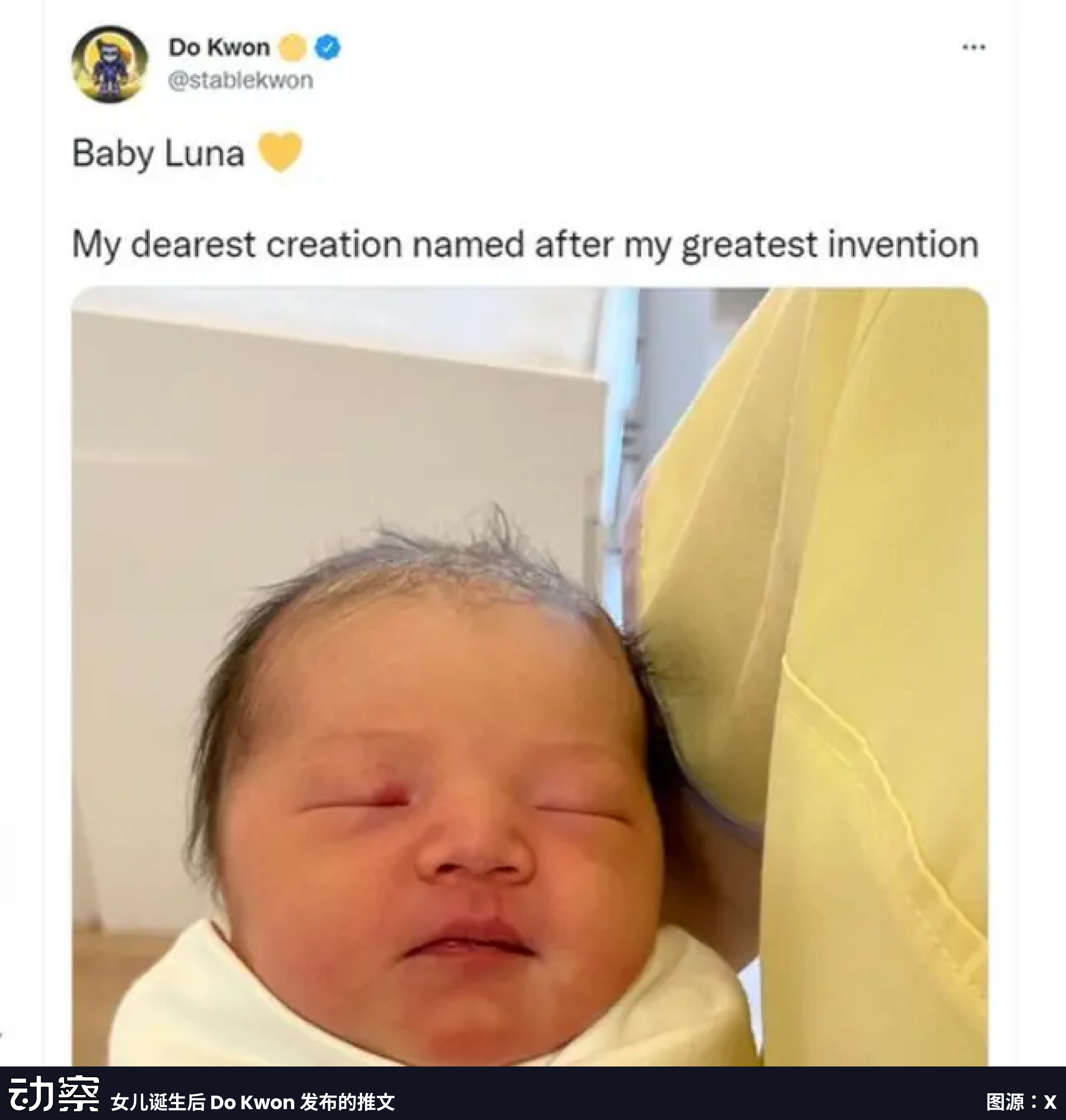
This statement sparked controversy. Supporters saw it as a reflection of his confidence in the project, while critics saw it as a display of extreme narcissism. It's unusual for a father to name his daughter after his own business venture. But even more unusual was his description of the project: "My greatest invention."
For Do Kwon, Terra is not just a business project, but also a manifestation of his personal genius and his legacy to the world.
In April 2022, the Terra ecosystem reached unprecedented heights. UST's market capitalization exceeded $18 billion, Luna's market capitalization exceeded $40 billion, and the total value of the entire ecosystem was close to $60 billion.
Do Kwon became a crypto superstar. Major media outlets rushed to cover his story, conferences invited him to give keynote speeches, and investors sought to partner with him. At these events, Do Kwon was always seen wearing a meticulously tailored suit, an expensive watch, and a confident smile.
Behind the apparent prosperity, risks are continuing to accumulate.
Some astute observers have begun to notice problems. Anonymous researcher FatMan posted a series of analyses on Twitter, pointing out the unsustainability of the Anchor Protocol. Economist Nouriel Roubini warned that algorithmic stablecoins have fundamental flaws. Even some leading figures in the cryptocurrency community have begun to question Terra's long-term prospects.
Do Kwon shrugged off the criticism. He saw it as the envy of losers. Such blind confidence would soon cost him dearly.
In May 2022, the spring sunshine in Singapore was radiant, and the Terra offices were bustling with activity. Employees were preparing for the upcoming launch of new products, and investors were pouring in money. Little did anyone know, however, that an unprecedented financial crisis was about to strike.
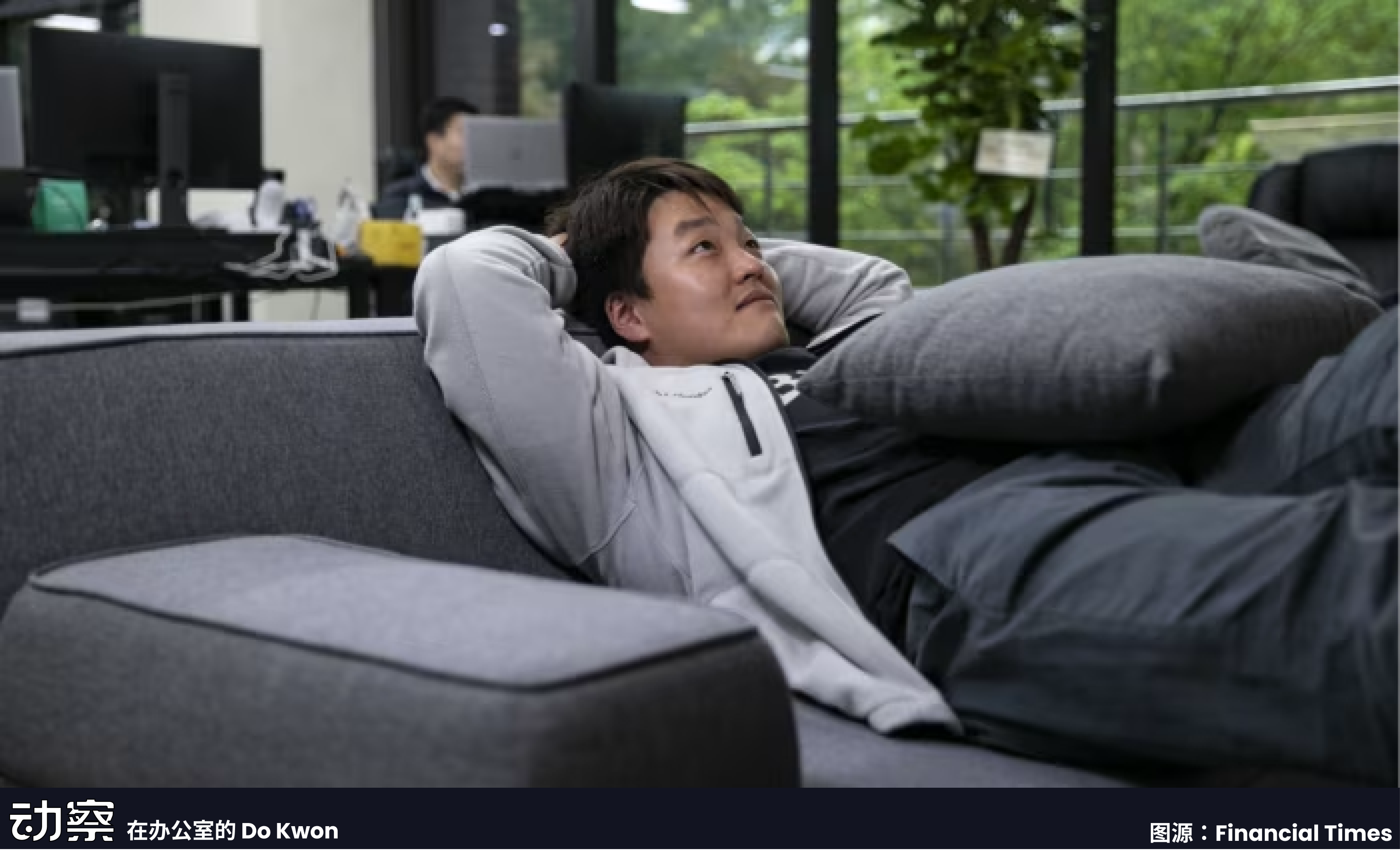
Do Kwon leans back on the sofa in his office, imagining himself as a hero who changed the world and who history will remember him as.
History will indeed remember him, but not as a hero.
For the full article, please go to the [Beating] official account to read
